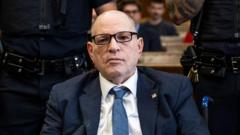As Harvey Weinstein steps back into the courtroom for his retrial in New York, the prosecution's opening statements paint a disturbing picture of a man wielding significant power to exploit vulnerable women. Assistant District Attorney Shannon Lucey described Weinstein as a "Hollywood gatekeeper" who used his influence to sexually harass and assault three women. This trial marks Weinstein's third legal battle in five years, following the overturning of a previous conviction.
Weinstein's Retrial: Power, Abuse, and the Voices of Survivors

Weinstein's Retrial: Power, Abuse, and the Voices of Survivors
In the New York retrial of Harvey Weinstein, prosecutors allege he manipulated his Hollywood power to abuse women, sparking a renewed focus on the #MeToo movement.
Weinstein stands accused of crimes against a former television production assistant, an aspiring actress, and a model, all of whom have come forward to recount their harrowing experiences. The details shared in court reveal a disturbing pattern of manipulation, where Weinstein allegedly lured women into his hotel room under false pretenses only to assault them. Lucey highlighted how, for years, the victims remained silent, weighed down by shame and the fear of retaliation from a man considered to be a titan of the film industry.
In his defense, attorney Arthur Aidala aimed to discredit these women's testimonies, claiming they had consensual relationships with Weinstein and were seeking fame and money. Aidala emphasized that the continuing interactions between Weinstein and his accusers post-encounters were inconsistent with accusations of assault.
The legal proceedings follow a court's decision last April to overturn Weinstein's original conviction, citing an unfair trial due to the introduction of unrelated testimonies. Despite serving time for earlier convictions, including a significant sentence in California, Weinstein remains embroiled in a web of legal troubles, with over 100 women accusing him of misconduct.
Weinstein's health complications have led to hospital stays, and his legal team continues advocating for better conditions while he is held. The #MeToo movement, catalyzed by Weinstein's exposure, has encouraged survivors to speak out against their abusers, marking a dramatic shift in societal attitudes towards sexual harassment in Hollywood.
As the trial progresses, the spotlight returns to the narratives of the women affected, aiming to highlight the pervasive issues of power dynamics and abuse within the entertainment industry.
In his defense, attorney Arthur Aidala aimed to discredit these women's testimonies, claiming they had consensual relationships with Weinstein and were seeking fame and money. Aidala emphasized that the continuing interactions between Weinstein and his accusers post-encounters were inconsistent with accusations of assault.
The legal proceedings follow a court's decision last April to overturn Weinstein's original conviction, citing an unfair trial due to the introduction of unrelated testimonies. Despite serving time for earlier convictions, including a significant sentence in California, Weinstein remains embroiled in a web of legal troubles, with over 100 women accusing him of misconduct.
Weinstein's health complications have led to hospital stays, and his legal team continues advocating for better conditions while he is held. The #MeToo movement, catalyzed by Weinstein's exposure, has encouraged survivors to speak out against their abusers, marking a dramatic shift in societal attitudes towards sexual harassment in Hollywood.
As the trial progresses, the spotlight returns to the narratives of the women affected, aiming to highlight the pervasive issues of power dynamics and abuse within the entertainment industry.





















